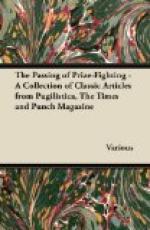It is astonishing how vain some authors are of their knowledge of any particular subject. Brewster monopolises that of the polarization of light and kaleidoscopes—poor Davy surfeited us with choke damps and the safety lantern—the author of “Enjoyment” is great on the subject of cook-shops; the whole production being, in fact, a dramatic lecture on the “slap-bang” system. Mr. Bang, the principal character, is the master of an eating-house, to which establishment all the other persons in the piece belong, and all are made to display the author’s practical knowledge of the internal economy of a cook-shop. Endless are the jokes about sausages—roast and boiled beef are cut, and come to again, for a great variety of facetiae—in short, the entire stock of fun is cooked up from the bill of fare. The master gives his instructions to his “cutter” about “working up the stale gravy” with the utmost precision, and the “sarver out” undergoes a course of instruction highly edifying to inexperienced waiters.
This burletta helps to develop the plan which it is the intention of the “council” to follow up in their agonising efforts to resuscitate the expiring drama. They, it is clear, mean to make the stage a vehicle for instruction.
Miss Martineau wrote a novel called “Berkeley the Banker,” to teach political economy—the “council” have produced “Enjoyment” as an eating-house keepers’ manual, complete in one act. This mode of dramatising the various guides to “trade” and to “service” is, however, to our taste, more edifying than amusing; for much of the author’s learning is thrown away upon the mass of audiences, who are only waiters between the acts. They cannot appreciate the nice distinctions between “buttocks and rounds,” neither does everybody perceive the wit of Joey’s elegant toast, “Cheap beef and two-pence for the waiter!” This kind of erudition—like that expended upon Chinese literature and the arrow-headed hieroglyphics of Asia Minor—is confined to too small a class of the public for extensive popularity, though it may be highly amusing to the table-d’hote and ham-and-beef interest.
The chief beauty of the plot is its extreme simplicity; a half-dozen words will describe it:—Mr. Bang goes out for a day’s “Enjoyment,” and is disappointed! This is the head and front of the farceur’s offending—no more. Any person eminently gifted with patience, and anxious to give it a fair trial, cannot have a better opportunity of testing it than by spending a couple of hours in seeing that single incident drag its slow length along, and witnessing a new comedian, named Bass, roll his heavy breadth about in hard-working attempts to be droll. As a specimen of manual labour in comedy, we never saw the acting of this debutant equalled.
We are happy to find that, determined to give “living English dramatists a clear stage and fair play,” the “Council” are bringing forward a series of stale translations from the French in rapid succession. The “Married Rake,” and “Perfection,”—one by an author no longer “living,” both loans from the Magasin Theatral—have already appeared.




